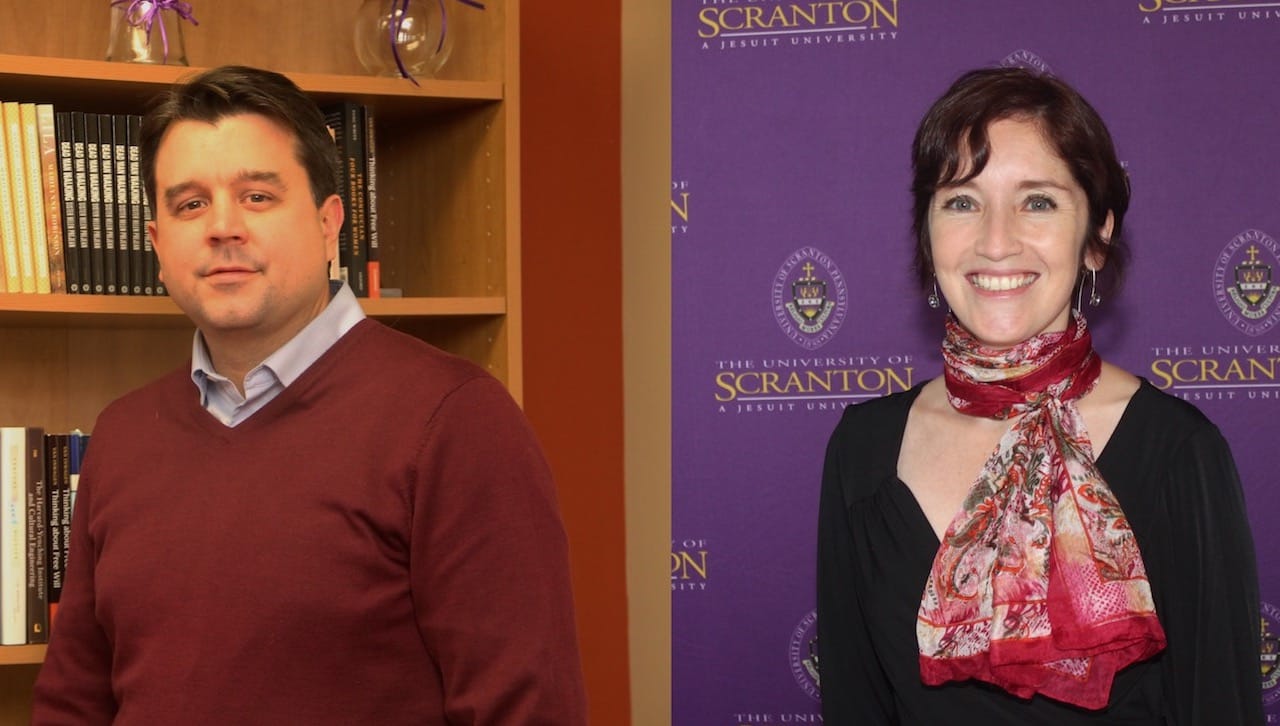Schemel Forum Fall Courses Offered Via Zoom

During the fall semester, University of Scranton professors will make Latin American authors come alive and explore the COVID-19 pandemic from a philosophical perspective. Schemel Forum evening courses will meet in six weekly sessions from 6 to 7:15 p.m. A zoom link will be emailed to participants.
“Inverted America: Great Stories from Latin America” will be taught by Yamile Silva, Ph.D., associate professor and chair of the Department of World Languages and Cultures.
“This course will take you on a journey through Latin America by reading and watching important short stories and films from one of the most vibrant parts of the world,” said Dr. Silva. “Along the way, we’ll explore the various literary styles writers have employed beginning with ‘el criollismo’ and ‘lo fántastico’ through to magical realism and contemporary artists working today. Inspired by the painting ‘Inverted America’ (1943) by Uruguayan artist Joaquín Torres, this course will include some stories by canonical writers such as Jorge Luis Borges, Julio Cortázar and Juan Rulfo, but will invert the traditional selection of writers and include more women writers.”
Participants will read recent works including short stories by Brazilian writer Clarice Lispector, whose writing has been described by Terrence Rafferty, book critic for “The New York Times,” as “exhilaratingly, arrestingly strange […] after a while you don’t know where you are, either in the book or in the world.” We will also read works by Samantha Schweblin, who was chosen in 2010 by “Granta” magazine as one of the 22 best writers in Spanish under 35 years old. Her book “Little Eyes” was recently nominated for the prestigious Man Booker International Prize. We will watch and analyze the psychological thriller “The Headless Woman” by Lucrecia Martel, the most critically acclaimed auteur in Spanish-language art cinema from Latin America.
Course discussions will address style, identity, representation, gender and sexuality, and influence in national and transnational contexts in these truly unique artistic works. Classes will meet on the following Mondays: Oct. 5, 12, 19 and 26; and Nov. 2 and 9.
Matthew Meyer, Ph.D., associate professor of philosophy, will teach “Responses to the COVID-19 Crisis: A Philosophical Perspective.” This seminar will look at the COVID-19 crisis from the perspective of political philosophy and examine how these philosophies shaped responses to it — in particular, through the conflict between individual rights and the common good.
“Today’s rapidly evolving news cycle is providing more and more material for the course,” said Dr. Meyer. Participants will discuss the debate between Dr. Anthony Fauci and Rand Paul; Attorney General Barr’s comments that compared stay-at-home orders to slavery; court rulings that deemed Wisconsin’s and Pennsylvania’s stay-at-home orders unconstitutional on the grounds that they violate individual liberty; and the impact of the Michigan Liberty Militia, which actively supports anti-mask and anti-lockdown protests.
Dr. Meyer said, “The course will begin with an open discussion of COVID-19 and these controversies. We will likely be reading and discussing selections from George Will, Richard Epstein, Michael Sandel and Robert Reich that examine the nature of freedom – and different understandings of this concept – and promote and critique the notion of the common good (some authors we will encounter even deny that such a thing exists).”
The course will conclude with a final discussion of the controversies surrounding COVID-19 in light of these readings and class discussions about freedom and the common good. Classes will meet on Thursdays, Oct. 15 and 22; Wednesday, Oct. 28; and Thursdays, Nov. 5, 12 and 19.
Area residents can enroll in any course for $60; Schemel Forum members and University staff, students and faculty can enroll free of charge. The Schemel Forum is also offering six virtual World Affairs Seminars during the fall semester, which are also available to area residents.
To register or for more information, contact Alicen Morrison, Schemel Forum assistant, at 570-941-6206 or alicen.morrison@scranton.edu. For more information on Schemel Forum programs and memberships, contact Sondra Myers, Schemel Forum director, at 570-941-4089 or sondra.myers@scranton.edu.






